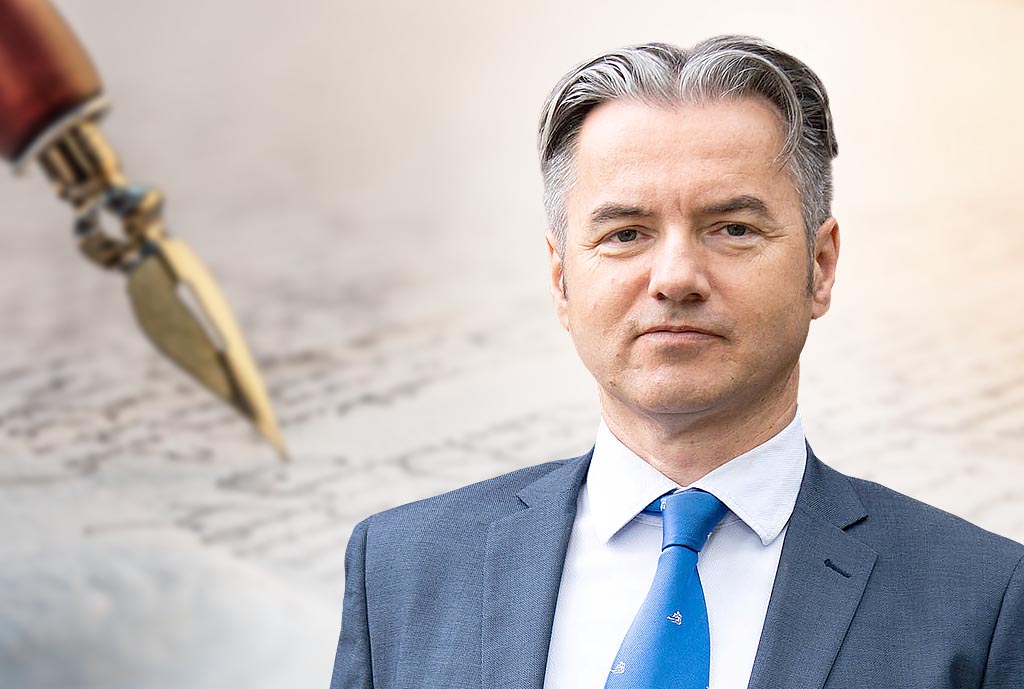By: Dr Metod Berlec
75 years ago, during the emerging Cold War, the North Atlantic Treaty Organisation (NATO) was founded on April 4th, 1949, in Washington. The founding members were Belgium, Denmark, France, Iceland, Italy, Canada, Luxembourg, the Netherlands, Norway, Portugal, the United Kingdom, and the United States. In 1952, Greece and Turkey, previously hostile neighbours, joined the defence alliance, followed by the Federal Republic of Germany in 1955 and Spain in 1982. After the fall of the Berlin Wall in 1989, NATO began gradually expanding to include countries in Central and Eastern Europe, which had previously been members of the socialist Warsaw Pact. In 1999, the Czech Republic, Hungary, and Poland joined NATO, followed by Bulgaria, Estonia, Latvia, Lithuania, Romania, Slovakia, and Slovenia in 2004. Albania and Croatia became members in 2009, Montenegro in 2017, and North Macedonia in 2020. Following the brutal Russian attack on Ukraine, previously neutral Scandinavian countries Finland and Sweden also joined the alliance. NATO is now the largest defence alliance in the world, consisting of 32 countries.
The original purpose of NATO, to contain the Soviet Union, disappeared with the collapse of that state at the end of 1991. However, member states agreed that further expansion of the alliance was in the interest of European security. With the Russian attack on Ukraine on February 24th, 2022, the alliance found a new purpose – supporting Kyiv, which openly desires NATO membership. French President Emmanuel Macron, who previously referred to NATO as “brain dead” in 2019, recently even called for consideration of deploying Western forces to Ukraine. According to some plans, these forces would be stationed along the border with Belarus and on the right bank of the Dnieper River, thereby somewhat relieving Ukrainian units facing a numerically and better armed opponent, as well as shortages of personnel, weapons, and ammunition. There are also ideas that individual countries could deploy their troops to Ukraine, without direct military confrontation between NATO units and Russian military units.
Of course, the question arises of how to stop Russian aggression. Undoubtedly, this could be achieved with greater military assistance from the West, but unfortunately, the West is preoccupied with many of its own issues. It lacks politicians who can deal with the criminal cunningness of Vladimir Putin. In the past two years, European countries have indeed increased public spending on defence, but still not enough compared to the Russian Federation, which transitioned to a war economy some time ago. The full tragedy of the war in Ukraine is depicted in the Ukrainian documentary film titled 20 Days in Mariupol, which won the Oscar for Best Documentary Feature at the recent Academy Awards ceremony. The war has been going on for over two years, and sadly, the world has already become somewhat “accustomed” to it. However, watching the film shakes one to the core, as it portrays the full brutality of Russian military aggression, with civilians suffering the most. The live footage of the war was captured by Mstyslav Chernov, a war photographer and journalist who risked his life to film the siege of Mariupol, where Russian forces were tightening their grip more violently every day. As a journalist for the Associated Press, he followed rescue teams transporting the wounded to hospitals. Medical teams fought for their lives, often unsuccessfully. The film shows heart-wrenching scenes of parents weeping as doctors were unable to revive their children. Pools of blood on stretchers, piles of bodies in the hospital basement, workers throwing corpses into mass graves…
SLOVENIANS CAN BE HAPPY THAT WE HAVE BEEN NATO MEMBERS FOR TWENTY YEARS, BUT AT THE SAME TIME, WE MUST REALISE THAT WE MUST TAKE PRIMARY RESPONSIBILITY FOR OUR OWN SECURITY…
Some scenes in the film are reminiscent of scenes from the Slovenian documentary Slovenia at the Barricades from 1991, with the difference being that the aggression of Yugoslav soldiers against Slovenia ended quickly due to successful Slovenian defence, whereas in Ukraine, it is different. The bloody Russian aggression continues, and people continue to suffer. This certainly would not have happened if the West had stood up to Putin years ago or if Ukraine were a NATO member. However, the Ukrainian situation is even more complex, as a significant part of the population in eastern and south-eastern Ukraine (mostly of Russian nationality) wishes to be part of the Russian Federation. Additionally, Putin disregards his own victims, focusing primarily on expanding the Russian empire.
Slovenians can indeed be happy that we have been NATO members for twenty years, but at the same time, we must realise that we must take primary responsibility for our own security…

